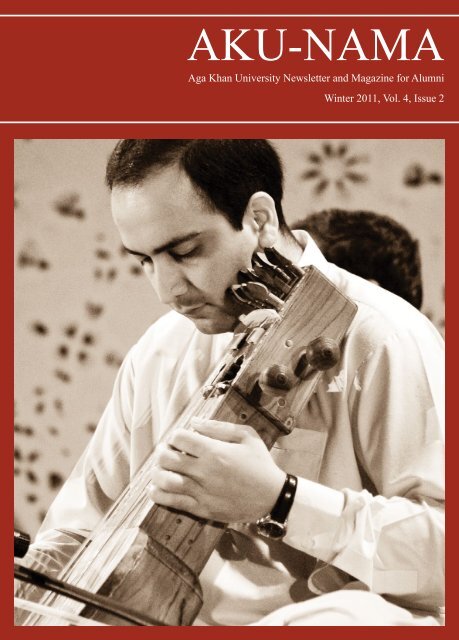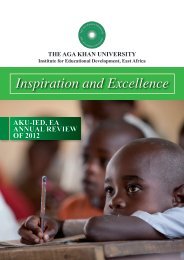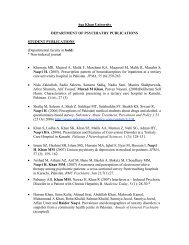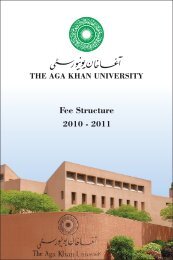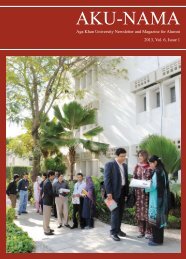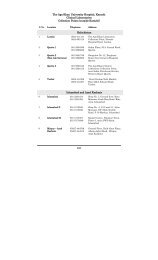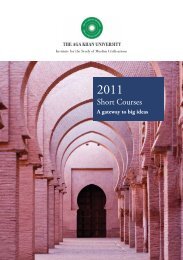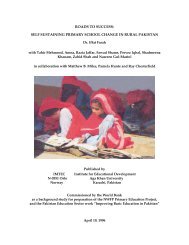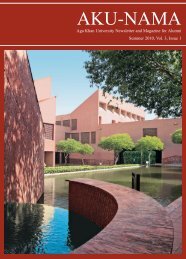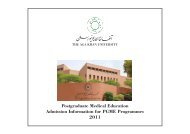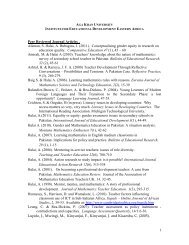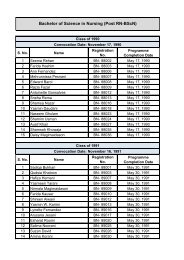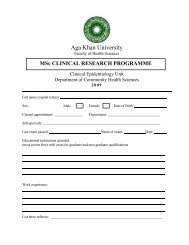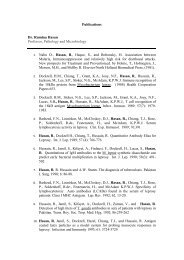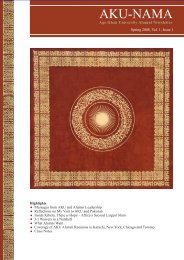Winter 2011, Vol. 4, Issue 2 - Aga Khan University
Winter 2011, Vol. 4, Issue 2 - Aga Khan University
Winter 2011, Vol. 4, Issue 2 - Aga Khan University
You also want an ePaper? Increase the reach of your titles
YUMPU automatically turns print PDFs into web optimized ePapers that Google loves.
AKU-NAMA<br />
<strong>Aga</strong> <strong>Khan</strong> <strong>University</strong> Newsletter and Magazine for Alumni<br />
<strong>Winter</strong> <strong>2011</strong>, <strong>Vol</strong>. 4, <strong>Issue</strong> 2
Editor-in-Chief<br />
Adeel A. Butt<br />
aabutt@gmail.com<br />
Twilight<br />
Taimur <strong>Khan</strong> performing at NIC Building Auditorium, Islamabad, Pakistan / Saadullah Bashir<br />
AKU-SON, P Nurses taking their pledge at the Lamp Lighting Ceremony held on May 6, <strong>2011</strong>.<br />
Audiovisual Department AKU<br />
IN this issue<br />
From the Editor’s Desk<br />
Poetry, Music and Medicine<br />
Play On<br />
The Road to Residency<br />
More Than Skin Deep<br />
We Can Make a Difference<br />
Making AKU Proud<br />
Beyond Medicine<br />
It’s Time for Afghanistan<br />
20 Years of Excellence<br />
Coming Together in Canada<br />
Stepping Ahead<br />
Campus Happenings<br />
Dr J. F. Mustard – An Inspiration to All<br />
Class Notes<br />
3<br />
4<br />
5<br />
6<br />
8<br />
9<br />
10<br />
12<br />
13<br />
14<br />
15<br />
16<br />
18<br />
19<br />
20<br />
Editorial Staff<br />
Shain Amershi, Executive Assistant<br />
alumni.nachapter@aku.edu<br />
Associate Editors<br />
Sadaf <strong>Khan</strong><br />
Medical College, North American Chapter<br />
skhancrs@gmail.com<br />
Rahila Zakir<br />
Medical College, European Chapter<br />
rahila.zakir@gmail.com<br />
Tazeen Jafar<br />
Medical College, Pakistan Chapter<br />
tazeen.jafar@aku.edu<br />
Erum Kabani<br />
School of Nursing<br />
erum.kabani@aku.edu<br />
Fahmida Mehdi<br />
School of Nursing<br />
fahmida.mehdi@aku.edu<br />
Nadim Farooqui<br />
Institute for Educational Development<br />
nadim.farooqui@aku.edu<br />
Nilufar Shariff<br />
Advanced Nursing Studies, East Africa<br />
nilufar.shariff@aku.edu<br />
Balkis Rouached<br />
Institute for the Study of Muslim Civilisations<br />
balkis19hope@yahoo.ca<br />
Marie Andrades<br />
Postgraduate Medical Education<br />
marie.andrades@aku.edu<br />
Advisory Members<br />
Firoz Rasul<br />
President<br />
Louis R. Ariano<br />
<strong>University</strong> Registrar<br />
Abdul Haq Wahedna<br />
Manager, Alumni Affairs<br />
Dhunmai Cowasjee<br />
Director, Public Affairs<br />
Shariq Haroon<br />
Senior Assistant Manager, Public Affairs<br />
Khuzaima Fatima Azam<br />
Assistant Manager, Public Affairs<br />
Adeel A. Butt<br />
Twilight’s Bella is an<br />
impressionable teenager. Like<br />
many her age, her heart and mind<br />
are divided between her two loves,<br />
Edward and Jacob. And even though<br />
she decides to marry Edward, Jacob<br />
still has a hold on her heart and<br />
mind, where he has his own well<br />
entrenched corner. And even after<br />
her betrothal and eventual marriage<br />
to Edward, she keeps Jacob close,<br />
cherishing her moments with him<br />
and his visits. Jacob, with his own<br />
issues and problems, also doesn’t<br />
really leave Bella and keeps coming<br />
back to remind her of his affection,<br />
devotion and dedication.<br />
Twilight may be just<br />
another movie story line. However,<br />
it was nearly a quarter century<br />
ago that one hundred of us were<br />
in Bella’s shoes. For many of us,<br />
our amours were divided too. Our<br />
Edward and Jacob were the United<br />
States or the United Kingdom<br />
and Pakistan. The pull of one has<br />
never completely pushed out the<br />
other. While we married one, we<br />
kept coming back to the other. For<br />
some, these short returns were<br />
for payback; for others it was for<br />
redemption; yet others did it for<br />
higher callings with the draw of the<br />
family one factor never far away<br />
from the minds of all of us.<br />
I suspect that most alumni<br />
have gone through some form of<br />
this love triangle. This is evident<br />
from the feisty debates observed on<br />
various alumni electronic mailing<br />
lists. Choosing between two loves is<br />
always difficult. Joy of being with<br />
one is always peppered with the<br />
pain of being away from the other.<br />
The connection with the ‘homeland’<br />
is strong, and there is a strong<br />
yearning to give back something<br />
in return for all we have received.<br />
Some of us have maintained<br />
connections with our first love<br />
through service and volunteering,<br />
be it in education, health care,<br />
philanthropy or disaster relief. Many<br />
of us have worked through our<br />
alma mater or through the alumni<br />
association, while others have given<br />
back through other organisations<br />
and even privately.<br />
With <strong>Aga</strong> <strong>Khan</strong> <strong>University</strong> now<br />
having a presence in at least three<br />
continents and eight countries, this<br />
dynamic is going to be ever more<br />
complicated, and hopefully ever<br />
more rewarding. What I hope is<br />
that all our loves receive the justice<br />
they deserve. And through this we<br />
will hopefully achieve the mission<br />
the <strong>University</strong> set out for, which at<br />
its core is to provide a meaningful<br />
contribution to society.<br />
The views and opinions expressed in this publication are of the individual authors alone and do not necessarily reflect the views or policy of the editorial board<br />
or <strong>Aga</strong> <strong>Khan</strong> <strong>University</strong>.<br />
2 3
Poetry, Music and Medicine<br />
Taimur <strong>Khan</strong>, MBBS ’02<br />
When I joined AKU in 1995, I<br />
was sure that I wanted to become<br />
a psychiatrist. I had read some<br />
works of Freud inspired by two<br />
revered elder brothers’ Ivy League<br />
education. I had been playing the<br />
guitar for five years, was very<br />
curious about the workings of the<br />
human body, and nurtured a vague<br />
fantasy of collating the physical<br />
and mental aspects of human life<br />
biochemically, psychoanalytically,<br />
musically and poetically.<br />
In high school, music was the<br />
first thing which made me realise<br />
I could concentrate on something<br />
worthwhile for extended periods.<br />
Studying medicine for a year<br />
enhanced my patience with books,<br />
and when I encountered literary and<br />
philosophical texts, I was surprised<br />
that so many things were suddenly<br />
making sense. As happens with<br />
great writings, existential concerns<br />
arose. I questioned my opinions and<br />
the type of music I played, which<br />
ultimately led to certain decisions I<br />
made about music and myself.<br />
Profoundly influenced by<br />
Nietzsche and Goethe, I believed<br />
that I had to pursue all my<br />
interests intensively, realising<br />
just in time that ours is an age of<br />
specialisation; and Goethe’s genius<br />
notwithstanding, science itself had<br />
changed over the past couple of<br />
centuries. But reasons are no match<br />
for passions, and so I thought I<br />
would teach myself poetry as I had<br />
dabbled in it since teenage.<br />
And this is where the story<br />
begins.<br />
I started devoting my time<br />
to my newfound love for raagbased<br />
classical music, one of<br />
the oldest musical traditions of<br />
the world. I was very far from<br />
knowing the esoteric realm of<br />
subcontinental classical music and<br />
the counter-intuitive dynamics of<br />
the sarangi, which I had discovered<br />
Taimur <strong>Khan</strong> immersed at a performance.<br />
Saadullah Bashir<br />
entirely by chance in a recording at<br />
a music shop in 1994. Soon after<br />
buying my first sarangi in 1996,<br />
I saw why this bowed instrument<br />
with 3 gut and 35 metal strings<br />
was considered to be so difficult to<br />
tune and play. Thanks to the kind<br />
consideration of Dr Jamsheer Talati,<br />
Associate Dean of Education at that<br />
time, I was able to take two years<br />
off during my education at <strong>Aga</strong><br />
<strong>Khan</strong> <strong>University</strong>, learned music, got<br />
an ample idea of poetic prosody and<br />
wrote poems and a novella.<br />
Returning to college, I had<br />
the peace of mind to continue my<br />
humanistic studies and medicine<br />
with more discipline. Music, I<br />
would ‘tell’ myself, I had to give<br />
up. But then I picked up the sarangi<br />
again in 2000 and continued to play<br />
till I graduated in 2002 – a time<br />
when I thought I would dedicate<br />
one more year to studying the<br />
instrument with Ustad Mubarak Ali,<br />
a sarangi nawaz of the Kapurthala<br />
Gharana, before resuming medicine.<br />
Thereon, I encountered our subcontinental<br />
music in its vastness:<br />
the elaborate approach towards<br />
improvisation within the framework<br />
of a given melodic idea known as a<br />
raag. I started anew with a resolve<br />
to study this instrument and art form<br />
comprehensively. For that I made<br />
flashcards, revised and memorised<br />
complex melodic patterns in ways<br />
that often reminded me of topics<br />
like glycolysis, the Kerb’s Cycle,<br />
cranial nerves, and so on – things<br />
that don’t make immediate sense<br />
until one discovers their application.<br />
It took me a year to realise that<br />
this was just the beginning and<br />
I decided to continue practicing<br />
and performing on the sarangi<br />
indefinitely. And so I became a<br />
classical musician.<br />
Hence from 2003 till today,<br />
I have been practicing and<br />
performing music regularly. I also<br />
received guidance from Ustad Allah<br />
Rakha, who is the last living master<br />
of the sarangi in Pakistan and has<br />
70 years of musical experience. My<br />
other important project is an online<br />
classical music archive, sarangi.<br />
info, launched in 2005. It is a<br />
growing collection of downloadable<br />
recordings of past masters, some of<br />
which were previously buried in the<br />
musty libraries of Radio Pakistan.<br />
Today, I’m less sure as to<br />
how or when the gap between<br />
neuroscience and psychoanalysis<br />
may be bridged, or what the<br />
connection between the intelligence<br />
of musical ideas and the workings<br />
of our minds and bodies may be,<br />
or how words bring coherence to<br />
seemingly divergent tendencies,<br />
and as to when or if I will ever<br />
practice psychiatry.<br />
However, I’m sure all these<br />
pursuits are valid perspectives on<br />
our humanity; that the brain has the<br />
plasticity to assimilate new ideas<br />
and skills at every stage of life; and<br />
Play On<br />
Hamid Bashir, MBBS ’02<br />
I was a relatively non-serious<br />
student but a serious thinker trying<br />
to search for my inner voice. There<br />
was so much I felt passionately<br />
about and so many issues that<br />
needed to be addressed. Child abuse<br />
cases presented to the emergency<br />
room, rape victims with accidental<br />
pregnancies, victims of sectarian<br />
violence, torture and bomb blasts,<br />
and the list kept growing. By the<br />
end of my third year in medical<br />
school, my thoughts started to take<br />
a more practical shape – I was<br />
discovering ways of communicating<br />
so I could be heard. AKU presented<br />
me with many opportunities to<br />
write, speak publicly and sing.<br />
And then the eureka moment<br />
happened. I heard Pulverized, a<br />
song by Salman Ahmad of<br />
Junoon fame, highlighting the<br />
violence in Pakistan. I had found<br />
my path. Music need not be<br />
stereotypical or meaningless. I<br />
wanted others to listen and learn<br />
at the same time from my music.<br />
The basic concept that music can<br />
sublimate into a thought-provoking<br />
experience led to the creation of<br />
Music4Cause, a forum to promote<br />
peace and harmony via music.<br />
It aims to raise a voice against<br />
war, terror and torture especially<br />
in the developing world, and is<br />
particularly geared towards<br />
creating awareness about child<br />
abuse and neglect.<br />
that participating in these various<br />
activities – including medicine –<br />
gave me an authentic sense of<br />
self and others.<br />
Living is an art circumscribed<br />
by circumstance and time, and<br />
the greatest achievements of both<br />
art and science ultimately rely on<br />
the imagination! Science makes<br />
progress in dramatic ways and<br />
can alleviate suffering, improve<br />
I came to the US for my residency<br />
and during my time off, I kept<br />
writing, editing and creating tunes<br />
with my music revolving around<br />
child labour and abuse.<br />
Three years later, I sent my<br />
first video to the ARY network.<br />
To my surprise, they immediately<br />
called me for an interview and<br />
things just took off from there. I<br />
began composing music on suicide<br />
bombings, torture and religious<br />
intolerance with a growing<br />
audience on Facebook, Twitter<br />
and YouTube.<br />
I do know that just like medicine,<br />
music too will continue to evolve<br />
and it will remain relevant<br />
as long as we exist.<br />
Now Music4Cause, despite<br />
being in its early stage, has<br />
accomplished several more<br />
goals. The music is now<br />
featured on Amazon, iTunes<br />
and the Daniel Pearl Foundation<br />
website. Several hundred visitors<br />
from all over the world visit<br />
Music4Cause YouTube channel<br />
every day to show encouragement<br />
and support.<br />
Music has been advocated as a<br />
tool to heal; I am not so sure about<br />
that yet. However, I do know that<br />
just like medicine, music too will<br />
our lives and understanding,<br />
but humane choices are also<br />
informed by the humanities, and<br />
their meaningfulness has to be<br />
rediscovered by each generation.<br />
Although making choices entails<br />
investing more time in one thing<br />
and less in another, I believe that<br />
the rigour of science and the vigour<br />
of art lie on one continuum with a<br />
great deal of complementarity.<br />
continue to evolve and it<br />
will remain relevant as long as<br />
we exist. I have learnt that by<br />
creativity and innovation we<br />
can give back to society, from<br />
which we have taken so much.<br />
As the world becomes more<br />
and more connected with the<br />
rise of a global conscience,<br />
we are heading towards<br />
an age where we will<br />
eliminate all borders.<br />
Chapuo drums from Kenya Coast and a ruubob<br />
from Tajikistan.<br />
Aika Grace Wangwe<br />
And perhaps music will be our<br />
ambassador and legacy for the<br />
coming generations.<br />
4 5
The Road to Residency<br />
Sana Syed, MBBS ’07<br />
Those were rough times – 9/11<br />
had just taken place and travelling<br />
to the United States for USMLE<br />
interviews had been doubly<br />
tense for many AKU graduates<br />
before they had finally seen their<br />
labour bear fruit – they had been<br />
successfully ‘matched’ and accepted<br />
for residencies in the US.<br />
“We were certainly in a<br />
generous mood to share all the<br />
information that had been gathered,”<br />
says Zainab Samad, MBBS ’00,<br />
the founding editor of Road to<br />
Residency (R2R), an electronic<br />
compilation guiding medical<br />
graduates on how to pursue a<br />
residency in the United States.<br />
The whole experience of<br />
preparing for the licensing<br />
exams, applying to programmes,<br />
interviewing and going through the<br />
match had made Samad realise the<br />
critical role alumni could play in<br />
helping aspiring graduates find the<br />
perfect match.<br />
Back then, the only way new<br />
graduates could get any help was<br />
through emailing forums. Mails<br />
were passed back and forth between<br />
alumni and the 80 to 90 about-tograduate<br />
Medical College students,<br />
with Amyn Lakhani, the electives<br />
coordinator at AKU, as the gobetween.<br />
Advice was just an email<br />
away with the added advantage that<br />
graduates quickly became part of a<br />
tightly knit alumni community. “But<br />
I also felt that some folks had an<br />
unfair advantage over others just<br />
because they were able to network<br />
better and hence knew more. I felt<br />
that we needed to put together a detailed<br />
document that clearly outlined<br />
the route to residency,” says Samad.<br />
She approached classmates who<br />
had been actively passing emails<br />
to students as well as posting their<br />
experiences on the topic. Umbereen<br />
Sultana Nehal, Nasha Talati, Nabil<br />
Tariq, Syed Irteza Hussain, Shehzad<br />
Sami, Shaheen Mithani, Salima<br />
Ahmed Zuberi<br />
Shafi and Zainab Samad from the<br />
Class of 2000 worked together<br />
to bring out the maiden version.<br />
General topics were divided<br />
amongst those who had been helpful<br />
while specific topics were assigned<br />
to people based on their expertise.<br />
The entire compilation was edited,<br />
organised into chapters and<br />
reordered according to relevance.<br />
And finally it was out there.<br />
The R2R takes scared new medical<br />
graduates through the potential<br />
quagmires of studying for the<br />
USMLE, applying for residencies,<br />
navigating the US and even<br />
educates the reader about the<br />
worrisome visa process post the<br />
matching process. With sections<br />
ranging from how to write a good<br />
personal statement for a residency<br />
application to discussing the best<br />
way to dress for an interview,<br />
this truly unique guide is full of<br />
insightful, tried and tested advice<br />
from AKU alumni who have been<br />
successful in securing residencies<br />
for themselves. Available electronically,<br />
all one has to do is to send<br />
an email to the popular alumni<br />
emailing group, akunet@topica.<br />
com to receive R2R. The emailing<br />
group, moderated by Fahim Jafary,<br />
MBBS ’90 is open to all medical<br />
graduates including those from<br />
other universities.<br />
Since its initial appearance,<br />
R2R has been updated by the<br />
Classes of 2003 and 2005, with a<br />
new edition currently being worked<br />
on by the Class of 2008. “The<br />
atmosphere at AKU can be very<br />
competitive but this seems to be one<br />
effort that has persisted and should<br />
continue,” says Nabeel Zafar,<br />
MBBS ’08 who is working to put<br />
out the latest updated version.<br />
What is remarkable is how<br />
this guide has benefited not only<br />
multiple batches of AKU Medical<br />
College students but also graduates<br />
from other medical universities in<br />
Pakistan and India. “The R2R is an<br />
effort to be proud of, I wish I had<br />
laid hands on this when I had been<br />
applying for a residency,” says<br />
Dr Mustafa Siddiqui, a graduate<br />
from the Army Medical College in<br />
Rawalpindi who is now the Director<br />
of the fellowship programme in neurology<br />
at Wake Forest <strong>University</strong>.<br />
Samad admits that initially she<br />
had not realised that R2R would turn<br />
into such a resource. “It was actually<br />
meant to benefit only our immediate<br />
juniors, and was supposed to be<br />
a private publication since the<br />
contributors gave very personal<br />
opinions on programmes and shared<br />
their contact information. But since<br />
the document was written in the<br />
spirit of helping others, I don’t think<br />
anyone contributing to the original<br />
effort felt strongly about it leaving<br />
the walls of AKU.”<br />
She has been pondering on a<br />
new idea these days, one that she<br />
says she might consider taking on<br />
with help from others. “I feel that<br />
in the pursuit of a great career, we<br />
lack a comprehensive document that<br />
contains not only guidance towards<br />
making career choices but also<br />
personal ones.” There are so many<br />
choices one is faced with at the end<br />
of training. There are the short-term<br />
questions. Academics or private<br />
practice? Go home or stay<br />
put? How to deal with visa issues?<br />
How to go back home? What are the<br />
opportunities out there and how to<br />
avail them? Then there are the big<br />
questions: How to be a successful<br />
clinician or a research-scientist?<br />
How to have a brilliant career<br />
along with a successful family life?<br />
“Those are questions that now haunt<br />
me and I wish that a generous and<br />
successful alumnus/alumna out<br />
there (and we have many of those)<br />
could put his/her mind to it and<br />
produce the ultimate resource to<br />
career/life planning and success.”<br />
The R2R is an excellent<br />
example of an alumni effort that<br />
has benefited hundreds of fresh<br />
graduates – a feat to be proud of<br />
and maintained.<br />
Nominations Wanted!<br />
Gary Otte<br />
The AKU-NAMA Editorial Board<br />
seeks nominations for distinguished<br />
alumni profiles from all programmes,<br />
departments and entities.<br />
Please send a short profile of your<br />
nominee to: alumni@aku.edu<br />
Request for<br />
Contributions<br />
The editors of AKU-NAMA<br />
invite you to contribute to the<br />
next issue of the magazine.<br />
Your story may highlight<br />
interesting career options,<br />
unique job experiences,<br />
ground-breaking research,<br />
innovative public service<br />
initiatives, or other materials<br />
of particular interest to the<br />
alumni. You can also contribute<br />
opinion pieces on trends<br />
in education and modern<br />
technology, book reviews and<br />
travelogues. Letters to the<br />
editor are also welcome.<br />
Article length should<br />
be approximately 500-600<br />
words. Images must be<br />
300 dpi resolution digital<br />
photographs (JPEG files<br />
over 1MB).<br />
Articles can be submitted<br />
at www.aku.edu/alumni/articlesubmissionform<br />
Class Notes provide<br />
you an opportunity to make<br />
announcements and share<br />
your successes with other<br />
AKU alumni. Submit your<br />
class notes at www.aku.edu/<br />
alumni/classnotessubmissionform<br />
Do you know any alumni<br />
still not on the AKU-NAMA<br />
mailing list? Direct them to<br />
www.aku.edu/alumniform<br />
Thank you for all your<br />
previous submissions,<br />
feedback and suggestions.<br />
Now let’s keep the ball rolling<br />
for the upcoming issue.<br />
6 7
More Than Skin Deep<br />
Dr Aisha Sethi with an albino child on Albinism Awareness Day in Lilongwe, Malawi.<br />
Dermatologist Aisha Sethi’s<br />
programme treats Malawi’s albinos<br />
and teaches residents that people<br />
with this condition should not be<br />
treated as pariahs.<br />
Albinos in Malawi not only have<br />
to contend with the constant risk of<br />
skin cancer from the intense African<br />
sun, but also with threats arising<br />
from the local myths surrounding<br />
their condition. Some people believe<br />
that weaving an albino’s hair into<br />
a fishnet increases the chances of<br />
a good catch. Others claim that an<br />
albino’s mother must have slept with<br />
a white man. Another cruel belief<br />
holds that spitting on an albino is<br />
the only way to guard against the<br />
condition in one’s family.<br />
Aisha Sethi, an assistant<br />
professor of dermatology in the<br />
Pritzker School of Medicine,<br />
<strong>University</strong> of Chicago, works to<br />
educate Malawians about albinism<br />
and improve medical treatment<br />
of the condition. Along with<br />
education, she has tried to dispel the<br />
superstitions that have led to horrific<br />
consequences for some people who<br />
suffer from it. In 2008, The New<br />
Dorothy Shope<br />
York Times detailed a string of 19<br />
albino murders in neighbouring<br />
Tanzania, where witch doctors used<br />
the victims’ body parts in potions for<br />
their supposed magical powers.<br />
That’s the kind of tragedy<br />
Sethi and her colleagues hope<br />
to prevent through a programme<br />
she began some time ago. It’s<br />
uncharted territory in a nation with<br />
no dermatologists, but Sethi hopes<br />
their work will be a model for other<br />
African nations where albinos have<br />
nowhere to turn.<br />
“When I was planning [to study<br />
tropical diseases], I couldn’t find a<br />
mentor because no one was working<br />
on this problem,” says Sethi, who<br />
studied global health issues while<br />
a resident at the Yale School of<br />
Medicine. “If we can get enough<br />
data in Malawi, we can convince<br />
other governments this problem<br />
needs attention.”<br />
The rate of albinism in some<br />
southern African tribes climbs as<br />
high as 1 in 1,500 births – far above<br />
the worldwide rate of 1 in 20,000.<br />
One theory is that the condition<br />
has persisted because of inbreeding<br />
among small tribal groups. Without<br />
dark skin to protect them from the<br />
sun’s ultraviolet radiation, African<br />
albinos face a progressive risk for<br />
skin cancer, and often do not live<br />
past 40.<br />
Born in the United States and<br />
educated in Pakistan, Sethi pursued<br />
dermatology because many tropical<br />
diseases such as haemorrhagic fever<br />
are diagnosed through their effects<br />
on the skin. Her interest in Malawi<br />
emerged during a trip to a medical<br />
training centre in Tanzania, where<br />
she learned of the region’s need<br />
for dermatologists.<br />
In 2007 Sethi started the<br />
first dedicated albinism clinic in<br />
Malawi’s capital city, Lilongwe, as<br />
part of a broader effort to improve<br />
dermatological care in the country.<br />
The initiative provides albinos with<br />
supplies, raises awareness of the<br />
condition, and offers screening for<br />
skin cancer.<br />
The project shows how<br />
dermatology can be a vital tool in<br />
tropical medicine, says Christopher<br />
Shea, chief of the Medical Center’s<br />
dermatology section, who helped<br />
Sethi get departmental funding for<br />
her work. “A skin disease does not<br />
often end life, but it can make life<br />
unbearable,” she adds. “Many of<br />
these conditions are relatively easy<br />
to treat; you don’t need high-tech<br />
tools.” Remedies are deceptively<br />
simple – sunscreen, long-sleeved<br />
clothing and wide-brimmed hats.<br />
Yet those items are elusive in a<br />
region with scarce resources. “These<br />
children need sunscreen every single<br />
day,” Sethi says.<br />
The albino clinic is just one<br />
part of Sethi’s outreach in Malawi,<br />
where she spends a month each year.<br />
The Chicago team is developing a<br />
pipeline of resources to help local<br />
medical officers such as Jimmy<br />
Malanda, who works with Sethi at<br />
her skin clinic in Lilongwe. The<br />
group arranged for nearby hotels<br />
to collect unused sunscreen from<br />
tourists, and coordinated with<br />
Raising Malawi, a charity founded<br />
by the pop star Madonna, to obtain<br />
reduced shipping costs for supplies,<br />
including sunscreen and surgical<br />
tools, from the United States.<br />
Even without an organised fundraising<br />
effort, the team is making a<br />
difference, Malanda says. During<br />
last year’s trip Sethi trained him<br />
in electrodessication, a method to<br />
remove small or superficial skin cancers.<br />
“We used to see albinos in our<br />
clinic, but we couldn’t do much with<br />
them,” he says. “Now we are taking<br />
proper care of our albino patients.”<br />
For the past three years Sethi<br />
has organised an annual Albino<br />
Awareness Day in Malawi aimed at<br />
educating the public, attacking the<br />
stigma, and providing screening for<br />
skin conditions. Last September she<br />
brought Dorothy Shope, AB ’07, an<br />
education coordinator in the Medical<br />
Center’s dermatology section to<br />
Malawi, who realised the team<br />
could help patients by providing<br />
inexpensive magnifying glasses –<br />
another simple remedy for the vision<br />
problems many albinos have.<br />
With more than 150 patients on<br />
their albino registry so far, the team<br />
hopes to learn which parts of the<br />
We Can Make a Difference<br />
Aisha Sethi, MBBS ’99<br />
My story begins 15 years ago, in<br />
1996, sitting in AKU’s auditorium<br />
listening to a lecture by Professor<br />
Joe McCormick about his work on<br />
the Ebola virus and HIV in Africa.<br />
I remember listening intently and<br />
before I knew it I was hooked.<br />
After graduating from AKU,<br />
I was able to convert one of my<br />
elective rotations into a job offer<br />
to be a postdoctoral fellow at the<br />
Department of Dermatology at Yale<br />
<strong>University</strong>. Later, during my dermatology<br />
residency at Yale, I served<br />
as chief resident and my mentors<br />
helped me pursue training opportunities<br />
at the Hospital for Tropical<br />
Diseases (HTD) in London and the<br />
Regional Dermatology Training<br />
Center (RDTC) in Moshi, Tanzania.<br />
In Tanzania, I met a very<br />
passionate dermatology officer,<br />
Audifacio Banda from Lilongwe,<br />
Malawi. He made me promise<br />
that after I finished my residency I<br />
would visit Malawi, a country with<br />
no dermatologists.<br />
Arriving in Malawi in August<br />
2007, I took a taxi to the skin clinic<br />
at Kamuzu Central Hospital (KCH)<br />
in Lilongwe to be greeted with the<br />
sad news of Audifacio’s untimely<br />
passing away just a week before.<br />
To fulfil my promise to my friend,<br />
I started a dermatology elective<br />
programme at KCH for medical<br />
students and dermatology residents.<br />
We began a weekly Thursday<br />
morning clinic for people with<br />
albinism which has now turned<br />
into a year-round practice and has<br />
produced an albinism registry with<br />
350 patients just at KCH.<br />
In 2007, we held the first<br />
Albinism Awareness Day in<br />
Lilongwe which was attended by<br />
about 50 people. By September<br />
<strong>2011</strong>, the number has risen to<br />
over 200. Each year we hand out<br />
sunscreens and hats while medical<br />
volunteers help teach those in<br />
attendance about albinism and<br />
provide free skin cancer screenings.<br />
I have spent the past six<br />
years building up a global health<br />
dermatology elective programme<br />
in Malawi in addition to being the<br />
Assistant Professor of Dermatology<br />
at the <strong>University</strong> of Chicago<br />
in the United States. In 2009, I<br />
helped arrange the first-ever North<br />
American conference on Tropical<br />
Skin Diseases – and invited<br />
Professor McCormick as one of the<br />
opening speakers for the event. In<br />
many ways it was quite nostalgic<br />
country have the greatest needs and<br />
to gauge the success of their skincare<br />
interventions. Beyond medical<br />
benefits, the project is teaching local<br />
albinos that they can live full lives,<br />
Malanda says, and finally emerge<br />
from the shadows.<br />
“We tell them, ‘You are not different<br />
from us,’” he says. “‘The only<br />
difference is that your skin cannot<br />
withstand the sun. Otherwise we are<br />
the same.’”<br />
Adapted from Manier, J.<br />
May/June 2009. More Than Skin<br />
Deep. The <strong>University</strong> of Chicago<br />
Magazine.<br />
to see a number of young medical<br />
students totally captivated by<br />
Professor McCormick’s lecture. I<br />
could tell that a number of those in<br />
attendance would end up opting for<br />
a career in tropical medicine much<br />
the same way I had.<br />
Earlier this year, we organised<br />
another international Global<br />
Health conference on tropical<br />
skin diseases and as the principal<br />
speaker/organiser I felt a sense of<br />
accomplishment. An overwhelming<br />
number of requests to help author<br />
articles and textbooks, or provide<br />
lectures on the subject of tropical<br />
medicine came pouring in.<br />
I have come full circle.<br />
Today, I teach and lecture on<br />
global health and tropical dermatology<br />
on four continents. I am also<br />
on the Global Health Committee at<br />
the <strong>University</strong> of Chicago. Over the<br />
last several years, I have led several<br />
training trips to East Africa where<br />
I supervise medical students and<br />
residents gain experience in tropical<br />
medicine. I like to think that Audifacio<br />
would have been happy to see<br />
what he has accomplished by inspiring<br />
me to act on the passion that<br />
Professor Joe McCormick roused in<br />
me 15 years ago.<br />
8 9
Making AKU Proud<br />
Top left: Asif Jafferani, MBBS ’11, receiving the Best<br />
Graduate Award, Medical College, from Chief Guest,<br />
Her Excellency Dr Suraya Dalil, Acting Minister of Public<br />
Health, Afghanistan.<br />
Middle left: MScN students: (left to right) Saleema Mansoor<br />
Allana and Rozina Karim Somani from Karachi, Jungyunhong<br />
from Korea, and Najma Miskeen <strong>Khan</strong> from Rawalpindi at<br />
the Convocation.<br />
Bottom left: Asmatullah Kilji receiving his MEd degree from<br />
Ambassador Saidullah <strong>Khan</strong> Dehlavi, Chairman, Board of<br />
Trustees, as President Firoz Rasul looks on.<br />
Above: BScN students: (left to right) Zahra Abdullah and<br />
Hina Hassanali Momin at their convocation ceremony.<br />
Opposite Page<br />
Top: Medical College students pose for a group photo<br />
at the reception following the distribution of degrees.<br />
Bottom right: Graduating MBBS Class of <strong>2011</strong> celebrates<br />
the moment.<br />
Bottom left: Zara Rafiq Sajwani receiving the Best<br />
Graduate Award, School of Nursing from the Chief Guest,<br />
Her Excellency Dr Suraya Dalil, Acting Minister of Public<br />
Health, Afghanistan.<br />
Hakim Sons Films<br />
1 0 1 1
Beyond Medicine<br />
Dr Saud Anwar, MBBS ’91 is a well-known pulmonologist and<br />
critical care specialist who has been actively involved in social<br />
service throughout his career, volunteering with many national and<br />
international organisations involved in education and health care. In<br />
<strong>2011</strong>, he was elected Town Councillor for South Windsor, Connecticut.<br />
What would you see as a highlight<br />
of your medical career?<br />
The highlight of a medical career<br />
is not one: it is every day, in every<br />
patient. Solving a problem at a<br />
particular moment in time and of a<br />
particular individual be it medical or<br />
non-medical is the highlight for that<br />
moment. Whether it is holding the<br />
hand of a family member who has<br />
just lost a loved one or identifying<br />
the right medicine for the right<br />
disease or providing support to a<br />
patient who is unable to take care of<br />
their own health – these are some of<br />
my daily highlights.<br />
The best parts of medicine are<br />
the moments that you cannot bill<br />
for or charge for or get paid for, in<br />
financial terms.<br />
I remember taking care of<br />
a family in Haiti. A 27-year-old<br />
woman with three young girls came<br />
to see me. This woman had lost her<br />
entire family, except her five-yearold<br />
daughter, in the quake; the other<br />
two girls were her nieces who had<br />
also lost their whole families. Yet<br />
the four of them had come together<br />
and were supporting and taking care<br />
of each other. The little five-year-old<br />
made sure that her new-found sisters<br />
had a seat to sit on and were examined<br />
by me before her. Their instinct<br />
to care for each other after such a<br />
terrible event is something I value to<br />
this day as a lesson well learnt.<br />
You are a doctor, a politician,<br />
a teacher, an advocate for<br />
human rights and a volunteer.<br />
How are you taking all these<br />
roles forward?<br />
Being a physician actually is an<br />
attitude, a mind-set and a way<br />
of life. We are advocates for our<br />
patients and we volunteer at times<br />
to take care of our patients’ needs.<br />
We, at the same time, have to start<br />
to understand that we have a role<br />
to play in taking care of the health<br />
issues in our society.<br />
When one identifies abnormal<br />
patterns of behaviour or existing<br />
policies which would have an<br />
impact long-term on the health of<br />
communities and society, one has<br />
to step in and see what role we can<br />
play, from a preventive, a diagnostic<br />
or even a therapeutic perspective.<br />
So, being a physician, having an understanding<br />
of the disease processes<br />
in the human body and then putting<br />
the community health into perspective<br />
allows one to play various roles<br />
in the whole spectrum of individual<br />
and community health care.<br />
I have learnt the art of time<br />
management to some degree. I have<br />
a list of goals and things that need<br />
to be completed on a specific day. I<br />
do not take any lunch breaks or any<br />
other breaks and try and complete<br />
the tasks within my day. After<br />
taking care of patients’ needs, I am<br />
blessed to have an understanding<br />
family who do let me complete my<br />
planned goals for the day. I do take<br />
planned time off from the medical<br />
profession on a weekly basis and<br />
that is the time I make sure that my<br />
other responsibilities are fulfilled to<br />
the best of my capacity.<br />
I believe in creating efficient<br />
systems which enhance one’s<br />
capacity and personal bandwidth.<br />
You’re engaged with a number of<br />
charitable organisations operating<br />
globally. What have you seen<br />
them accomplish?<br />
My work is focused on developing<br />
models for others to follow which<br />
can increase scale and have an<br />
opportunity of impacting policy<br />
which can translate into making a<br />
bigger difference.<br />
Take the example of the South<br />
Windsor Haiti School project which<br />
involves an integrated approach to<br />
the education, nutrition and health<br />
care of preschool children and<br />
provides free services for all three.<br />
If this works, we will have created<br />
a model, which could be adopted by<br />
towns in the United States, building<br />
a long-term sustainable relationship<br />
and emotional understanding<br />
between two cultures.<br />
Look at Ibtida, the volunteerbased,<br />
non-religious, non-political,<br />
non-profit organisation that a group<br />
of us set up in 2003 working to<br />
provide quality education to underprivileged<br />
children in the rural areas<br />
of Pakistan. We believe that the only<br />
way to break the vicious cycle of<br />
poverty and ignorance is through<br />
education. Our investment in these<br />
children’s future – with appropriate<br />
curriculum – is allowing them<br />
not only to be educated, but also to<br />
become enlightened individuals.<br />
What have been some of the<br />
challenges faced by the American<br />
Muslim Peace Initiative, a group<br />
that you founded and co-chair?<br />
The challenges in the world with<br />
respect to understanding the<br />
diversity of faiths and the challenges<br />
with respect to harmony have<br />
increased significantly.<br />
The challenges faced by our<br />
initiative have been increasing the<br />
scale of our activities and having<br />
an infrastructure is important as all<br />
the work is volunteer-based. You<br />
have to remember that the people<br />
who are spreading a negative mindset<br />
about Muslims and Islam have<br />
more resources than the ones who<br />
are working on the positive end of<br />
the spectrum. Our job is to try and<br />
keep pace with the needs and this<br />
challenge is an ongoing process.<br />
What activities have you engaged<br />
in as Town Councillor for South<br />
Windsor, Connecticut?<br />
We are nine members who oversee<br />
the governance, policies and budget<br />
of the town. During my term, I<br />
have been able to help decrease the<br />
polarisation within the two political<br />
parties in town as I have served<br />
as a person who supports the right<br />
ideas and policies regardless of who<br />
recommends them – my party, the<br />
Democrats, or the Republicans. We<br />
need to develop an understanding<br />
of issues, rather than trying to score<br />
points, and so I feel that I have<br />
brought a common sense approach<br />
towards the challenges that lie<br />
ahead of our community.<br />
In June, at the completion of<br />
the budget process for the town,<br />
many of my fellow council<br />
members stated that this budget vote<br />
passed because of my effort to bring<br />
people together and to negotiate<br />
common ground.<br />
As a physician, I have used my<br />
training in disease and symptom<br />
approach to tackle some of the challenges.<br />
For example, I am the first<br />
person in our community to study<br />
the baseline characteristics, issues<br />
and needs of senior citizens in the<br />
community, to assess and identify<br />
ways of helping them better.<br />
Does one need a particular<br />
attitude in order to succeed?<br />
The definition of success needs to<br />
be broader. It is a continuous effort<br />
of improving oneself, both within<br />
and without. For aspiring doctors,<br />
one should understand that the<br />
most important time in your life<br />
is the moment you are living in.<br />
One cannot control the past, the<br />
future is just a mystery that we do<br />
not know about, the present time is<br />
our gift to accept.<br />
Making the right choices by<br />
fulfilling our responsibilities with<br />
complete honesty spells success.<br />
It’s Time for<br />
Afghanistan<br />
Setting the tradition, <strong>Aga</strong> <strong>Khan</strong><br />
<strong>University</strong> Programme office in<br />
Afghanistan organised the first AKU<br />
alumni reunion at the Kabul Serena<br />
Hotel on June 28, <strong>2011</strong>. Presided<br />
over by Dr Rozina Karmaliani,<br />
Interim Dean of the School of<br />
Nursing, the event brought together<br />
nearly 30 alumni including 18<br />
from Pakistan and Tajikistan<br />
who are currently serving in<br />
Afghanistan, their spouses as well as<br />
representatives of AKU’s leadership.<br />
The <strong>University</strong> alumni are<br />
serving in important positions in<br />
the health and education sectors<br />
and contributing significantly in<br />
the redevelopment of Afghanistan.<br />
They are participating in policy<br />
making, institute building, capacity<br />
development and training of human<br />
resources, standardisation of health<br />
and education systems, and research<br />
in the country.<br />
Individual alumni introduced<br />
themselves and acknowledged the<br />
fact that the <strong>University</strong> has helped<br />
shape their careers, by virtue<br />
of which they are now serving<br />
Afghanistan in various capacities.<br />
Dr Karmaliani appreciated<br />
the valuable contribution of the<br />
<strong>University</strong>’s alumni in Afghanistan<br />
and also shared highlights of<br />
AKU initiatives and programmes<br />
worldwide.<br />
Dr Parvez Nayani, Head AKU<br />
Programme in Afghanistan,<br />
Mr Lee Hilling, Chair of Provisional<br />
Operating Committee, Mr Nadeem<br />
Mustafa <strong>Khan</strong>, Director General and<br />
CEO, AKUH Asia, and Mr Aziz Jan,<br />
CEO and Director General, French<br />
Medical Institute for Children, also<br />
shared their views and thoughts with<br />
the alumni. The event ended with a<br />
vote of thanks by Dr Karmaliani.<br />
Mukhtar Ali <strong>Khan</strong>, Instructor,<br />
<strong>Aga</strong> <strong>Khan</strong> <strong>University</strong> Programme<br />
in Afghanistan.<br />
1 2 1 3
20 Years of Excellence<br />
Aliya Saeed, MBBS ’91<br />
“Plane ticket $ 650, appointment<br />
to get the hair dyed a youthful<br />
shade $ 125, the joy of being<br />
recognised instantly by a friend<br />
who hasn’t seen you in two<br />
decades … priceless.”<br />
On Independence Day weekend<br />
in the US, some of us rounded<br />
up whiny kids and long-suffering<br />
spouses while others came solo.<br />
We texted madly, drove, flew, even<br />
missed connecting flights yet<br />
braved our way to the reunion in<br />
St. Louis, Missouri.<br />
St. Louis was the perfect venue<br />
for the Association of Physicians<br />
of Pakistani Descent of North<br />
America’s summer meeting this<br />
year as well as the <strong>University</strong>’s<br />
alumni reunion. With the AKU<br />
Alumni Association hosting the<br />
reunion banquet, the Class of 1991<br />
and 2001 celebrated their 20th and<br />
10th year anniversaries respectively.<br />
A tribute to the Class of ’91<br />
was paid in the form of a slide<br />
show reminiscent of the skits that it<br />
presented during the annual days<br />
of yore, except that now it skewered<br />
class members and not faculty.<br />
Following the dinner, the class<br />
members reconvened and stayed<br />
up late reminiscing (and gossiping<br />
Farhat Abbas, Dean Medical College with alumni.<br />
Graduates of AKU MBBS Class of 1991 pose for a photograph at the 20-year reunion.<br />
about those who did not come).<br />
The next day, we started<br />
fundraising for the class gift.<br />
Bilal Murad, MBBS ’91 and<br />
Naheed Murad, MBBS ’91 were<br />
assigned the task of coordinating<br />
the North America fund raising,<br />
with regional coordinators<br />
identified from amongst the alumni<br />
present. Bashir Hanif, MBBS, ’91<br />
was nominated as the class gift<br />
coordinator for Pakistan.<br />
All the alumni in attendance<br />
came to the podium and updated<br />
the class about what they had been<br />
up to; spouses and children who<br />
Aliya Saaed<br />
were in attendance were introduced.<br />
Teenagers, who would normally<br />
sulk at such gatherings, were seen<br />
having animated conversations with<br />
each other, and babysitting the little<br />
ones. This felt very much like a<br />
gathering of the family that we have<br />
all become part of for over a quarter<br />
of a century.<br />
The class is indebted to Faiz<br />
Bhora, MBBS ’92, Atif Shafqat,<br />
MBBS ’93, Shain Amershi,<br />
Executive Coordinator, <strong>Aga</strong> <strong>Khan</strong><br />
<strong>University</strong> Alumni Association<br />
North America for making this<br />
reunion possible.<br />
Aliya Saaed<br />
Coming Together in Canada<br />
Alumni with AKU leadership at Toronto Luncheon.<br />
Dear Alumni,<br />
Between May 28 and June 13,<br />
a number of members of the AKU<br />
Leadership Team toured Canada.<br />
I was proud to be a part of the team<br />
that consisted of President Firoz<br />
Rasul; Dr Saida Rasul; Mr Zahir<br />
Janmohamed, Director-General,<br />
Resource Development; Ms Carol<br />
Ariano, Vice-President, Human<br />
Resources; Mr Asif Fancy,<br />
Senior Advisor, President’s Office;<br />
and Mr Navroz Surani, Director,<br />
Human Resources. This visit was<br />
aimed at increasing awareness of the<br />
<strong>University</strong>’s current programmes<br />
and sharing AKU’s vision for the<br />
future. More importantly, it was an<br />
Alumni with AKU Leadership Team at reunion meeting in Vancouver.<br />
opportunity to meet with donors,<br />
alumni, supporters and well-wishers,<br />
providing a platform for questions<br />
to be asked and feedback to<br />
be obtained.<br />
Being responsible for AKU<br />
Alumni Affairs globally, for me,<br />
the highlight of this trip was the<br />
opportunity to meet alumni. This<br />
was the first time AKU alumni<br />
meetings with representation from<br />
the <strong>University</strong> had been held in<br />
Canada. I met with alumni in<br />
Montreal, Vancouver, Calgary,<br />
Edmonton and Toronto. It was a<br />
delight for me to speak to many<br />
alumni personally and I was touched<br />
by the warmth, joy and sense of<br />
Sultan Baloo<br />
Abker Dewji<br />
pride with which alumni of all<br />
schools came together. What I found<br />
to be of great value was that these<br />
meetings enabled alumni within the<br />
same geographical area to connect<br />
with each other.<br />
In speaking to many alumni in<br />
Canada and globally, it is clear to me<br />
that there is a thirst for connection<br />
with the <strong>University</strong> and fellow<br />
alumni. I am working on developing<br />
avenues to enable new connections<br />
and to strengthen existing ones and<br />
will communicate with you as they<br />
get established.<br />
In the interim, I urge you<br />
to update your current contact<br />
information at: www.aku.edu/alumni.<br />
Alumni and Alumni Associations<br />
have a significant role to play in<br />
enriching the lives of students and<br />
alumni. They are an important<br />
partner in the advancement of<br />
the <strong>University</strong>. After all, the good<br />
standing of a <strong>University</strong> is a<br />
reflection of the success achieved by<br />
its alumni and now that AKU is just<br />
over 25 years old, I am confident<br />
that together, we are ready to build<br />
strong alumni associations as unique<br />
as the <strong>University</strong> itself.<br />
Louis R. Ariano, <strong>University</strong><br />
Registrar.<br />
1 4 1 5
Stepping Ahead<br />
Once you meet her, you know that<br />
Dr Zeenat Sulaiman, RN ’87, is a<br />
go-getter. Starting off as a registered<br />
nurse at the <strong>Aga</strong> <strong>Khan</strong> <strong>University</strong><br />
Hospital in Karachi, moving on<br />
to becoming a full-time faculty<br />
member at the School of Nursing<br />
in Pakistan, she is currently the<br />
Chief Nursing Officer (CNO), at the<br />
<strong>University</strong> Hospital in Nairobi.<br />
“As soon as I stepped out of<br />
SON, I knew that just having a<br />
diploma was not enough. I had to<br />
grow. At that time, my ambition was<br />
not to be CNO but to ensure that I<br />
would have an ongoing education.<br />
So from being a registered nurse I<br />
went on to do a BScN and then a<br />
master’s in nursing in the States.<br />
By then, I had started working in<br />
nursing administration and decided<br />
to do a master’s in health care. Inbetween<br />
I have been working and<br />
have just finished my doctorate from<br />
Johns Hopkins,” says Dr Sulaiman.<br />
Dr Zeenat Sulaiman, RN ’87<br />
But it has been studies with distinction:<br />
Listed on the Dean’s Honor<br />
List at the Medical <strong>University</strong> of<br />
South Carolina, Charleston in 1998;<br />
a recipient of the Administrative<br />
Residency Merit Scholarship from<br />
the Ralph H. Johnson Department<br />
of Veterans Affairs Medical Center,<br />
Charleston in 1993; and the only<br />
student to receive the <strong>Aga</strong> <strong>Khan</strong><br />
<strong>University</strong> scholarship in 1991.<br />
Sulaiman feels that with academics<br />
comes experience and with<br />
experience comes growth. This<br />
belief – and boldness – has empowered<br />
her to seize opportunities<br />
and make the most of them. Take<br />
her last professional decision. She<br />
was working as Associate Director,<br />
Nursing Services, leading the team<br />
of surgery, critical care and operating<br />
room nurses at AKUH, K when<br />
in 2001 the <strong>University</strong> Hospital in<br />
Nairobi approached her to lead their<br />
nursing team. Taking an intrepid<br />
leap forward, she took the decision<br />
to move to Nairobi.<br />
Upon her arrival in Nairobi, one<br />
of the first challenges was to reduce<br />
the nursing turnover rate. Over a<br />
quarter of the nurses were leaving<br />
the hospital every year, for a variety<br />
of reasons; by 2010, less than onetenth<br />
were turning over. It was Dr<br />
Sulaiman’s success in making decision<br />
makers understand the importance<br />
of nurses in the multidisciplinary<br />
working environment of health<br />
care systems which facilitated her<br />
in achieving this mark. “A nurse<br />
cannot work alone. It is important<br />
that we understand that we work in<br />
a system with other clinicians such<br />
as doctors, pharmacists, pathologists<br />
and other non-clinical support<br />
personnel and together we make a<br />
team that provides quality patient<br />
care. As a critical care nurse on the<br />
bedside, I realised that a leader is<br />
nothing without a team and I took<br />
Audiovisual Department AKU<br />
this learning from my bedside role<br />
to my leadership role and as a leader<br />
have always worked on developing<br />
an empowered, educated and motivated<br />
team,” says Dr Sulaiman.<br />
At the same time, she also<br />
continued working closely with the<br />
School of Nursing as an adjunct<br />
faculty member in Nairobi. “To be<br />
a good nursing leader I have to be<br />
embedded in clinical practice and I<br />
strongly believe that for one to be a<br />
good teacher it is just as important<br />
to be clinically competent. It is<br />
essential that I talk to my students<br />
in class about real life experiences.<br />
I can’t separate the two roles – one<br />
benefits the other. My heart is in<br />
clinical nursing, the learning from<br />
which I take to my classroom and<br />
the learning from my teaching I take<br />
to my administration and this goes<br />
back and forth.”<br />
Sulaiman feels that<br />
with academics comes<br />
experience and with<br />
experience comes<br />
growth. This belief<br />
– and boldness – has<br />
empowered her to seize<br />
opportunities and make<br />
the most of them.<br />
She has been equally supportive<br />
of young nurses, mentoring them to<br />
build rewarding careers. Her biggest<br />
challenge has been to prepare<br />
nurses at the undergraduate level<br />
coming to work at AKUH, N who<br />
have graduated from various local<br />
schools in Kenya. “I get nurses from<br />
all over the country who are warm,<br />
dedicated and who have the passion<br />
for the profession. However, they<br />
lack the skills, the art of negotiation,<br />
the leadership qualities or the will<br />
to take a stand for their own opinion<br />
or to advocate for their patient’s<br />
treatment. Since no undergraduate<br />
programmes exist in East Africa the<br />
basic clinical skills of these nurses<br />
Dr Zeenat Sulaiman, RN ’87<br />
need to be strengthened,” elaborates<br />
Dr Sulaiman. Therefore “a lot of my<br />
time and energy goes into bringing<br />
my nursing staff up to a certain level<br />
through a systematic thought-out<br />
education programme. All nurses<br />
have to take mandatory core competency<br />
education about service<br />
excellence. Leadership courses in<br />
which training in assertiveness is<br />
given are a must. The final outcome<br />
is to empower nurses to the level of<br />
becoming patient advocates. What<br />
is most fulfilling is that most nurses<br />
are not leaving the hospital and<br />
now there is a dependable team of<br />
nurse managers who can handle a<br />
lot on their own.” She also shared<br />
her enthusiasm about AKU starting<br />
its own undergraduate studies in<br />
nursing in 2015 in Nairobi.<br />
To date, Dr Sulaiman has been<br />
on the forefront of most AKU<br />
projects in East Africa. Actively involved<br />
with the planning, construction<br />
and staffing of the Heart and<br />
Cancer Centre (HCC) in Nairobi has<br />
been another landmark achievement<br />
of her career. “In 2004, I started as a<br />
client representative of the clinical<br />
team working with my doctors and<br />
nurses and the architects to plan the<br />
Audiovisual Department AKU<br />
facility.” She used her earlier experience<br />
of developing a multipurpose<br />
building, the Nazarali-Walji building<br />
in Karachi. With the HCC, she<br />
has been involved with three types<br />
of planning. The first is programme<br />
planning that envisions what exactly<br />
the clinical programme would look<br />
like in 20 years in the building.<br />
The second is the planning of the<br />
resources such as human resources/<br />
medical equipment and the third is<br />
space planning to ensure that the<br />
envisioned programme fits into the<br />
building being constructed.<br />
For Dr Sulaiman, HCC<br />
is definitely not the end but<br />
the beginning of a whole new<br />
opportunity to take health care<br />
forward. Patients do not have to<br />
go to India and South Africa but<br />
can receive quality, international<br />
standard care close to their homes.<br />
On another note, it is going to lead<br />
to a lot of educational programmes<br />
for local students. “We are<br />
planning oncology and cardiology<br />
fellowships. Therefore it is not just a<br />
building for patients but a promising<br />
avenue that is going to take care of<br />
our health education as well,” says a<br />
satisfied Dr Sulaiman.<br />
1 6 1 7
Prime Minister Raila Odinga and His Highness the <strong>Aga</strong> <strong>Khan</strong> unveil the plaque marking the foundation<br />
of the new Graduate School of Media and Communications.<br />
Aziz Islamshah<br />
Leading the Way<br />
The foundation ceremony of the new<br />
Graduate School of Media and<br />
Communications in Nairobi was<br />
held on July 27, <strong>2011</strong>. The design<br />
and development of the School’s<br />
state-of-the-art facilities in Nairobi<br />
are underway, with the launch of<br />
academic programmes planned for<br />
2014. The School will eventually<br />
offer five core programmes, each<br />
supporting a distinct need. A Master<br />
of Arts in Multimedia Journalism<br />
will be the initial degree programme<br />
offered along with a variety of<br />
short courses in various mediarelated<br />
subjects.<br />
Heart and Cancer<br />
Centre Launched<br />
With outstanding international<br />
standard facilities, the new<br />
US$ 50 million <strong>Aga</strong> <strong>Khan</strong><br />
<strong>University</strong> Hospital’s Heart and<br />
Cancer Centre in Nairobi will offer<br />
cardiology and oncology treatments<br />
utilising the latest screening and<br />
treatment technologies. The Centre<br />
will also carry out region-specific<br />
research on heart disease as well as<br />
cancer. It is an integral part of<br />
expansion plans for AKU’s Faculty<br />
of Health Sciences in the region<br />
which will include undergraduate<br />
medical and nursing programmes as<br />
well as the establishment of<br />
a School of Allied Health<br />
Professionals. Current planning also<br />
includes the expansion of the <strong>Aga</strong><br />
<strong>Khan</strong> <strong>University</strong> Hospital, Nairobi<br />
to a 600-bed tertiary care facility.<br />
People in New Positions<br />
Dr Greg Moran is the new Provost<br />
of the <strong>University</strong> and brings with<br />
him over two decades of experience<br />
as faculty, researcher and theses<br />
supervisor. Dr Moran has been<br />
a member of the faculty of the<br />
<strong>University</strong> of Western Ontario,<br />
Canada since 1977 and a full<br />
Professor since 1992. He holds an<br />
undergraduate degree in Psychology<br />
from McGill <strong>University</strong>, Montreal<br />
and his graduate degrees from<br />
Dalhousie <strong>University</strong>, Halifax,<br />
Canada. Both his master’s and his<br />
doctoral theses were on animal<br />
behaviour but his research for the<br />
past 25 years has been in early<br />
child development.<br />
Sought after as a presenter and<br />
advisor on university policy matters,<br />
he co-authored a book on this topic<br />
in <strong>2011</strong>. As a researcher, he has a<br />
strong record of publications and<br />
grant support. Dr Moran has been<br />
registered as a clinical psychologist<br />
in Ontario for more than 25 years.<br />
Dr Fauziah Rabbani has been<br />
appointed Chair, Department of<br />
Community Health Sciences, Medical<br />
College, Pakistan. She holds a<br />
doctorate from Karolinska Institutet,<br />
Sweden and a master’s degree in<br />
Public Health from the <strong>University</strong> of<br />
Alabama, USA. She joined AKU as<br />
an instructor in 1989 and progressed<br />
to become a professor in 2009. Dr<br />
Rabbani has held several administrative<br />
posts at CHS. She is also a<br />
recipient of the Pakistan Academy<br />
of Medical Sciences’ Gold Medal<br />
and the Commonwealth Award of<br />
Excellence for Good Practices in<br />
Women’s Health in connection with<br />
AKU’s Urban Health Programme.<br />
Awards<br />
Investing in Trauma Care<br />
A grant to strengthen research<br />
capacity in the acute care of<br />
trauma and injuries in Pakistan<br />
has been awarded by the Fogarty<br />
International Center, National<br />
Institutes of Health, United States.<br />
This new five-year Johns<br />
Hopkins – Pakistan International<br />
Collaborative Trauma and Injury<br />
Research Training Programme<br />
grant is a competitive renewal of<br />
an earlier programme and has been<br />
awarded to Dr Adnan A. Hyder,<br />
MBBS ’90, Director, Johns Hopkins<br />
International Injury Unit and<br />
Associate Professor of International<br />
Health at Johns Hopkins Bloomberg<br />
School of Public Health, US and<br />
Dr Junaid Razzak, MBBS ’94,<br />
Chair, Department of Emergency<br />
Medicine, AKU (currently<br />
on sabbatical).<br />
The programme will involve<br />
Johns Hopkins <strong>University</strong>, <strong>Aga</strong><br />
<strong>Khan</strong> <strong>University</strong> and Khyber<br />
Medical <strong>University</strong>. It will focus<br />
on using US expertise to strengthen<br />
Pakistani institutions, promote a<br />
sustainable research enterprise<br />
focused on the acute care of<br />
trauma and injuries and enable<br />
national dissemination of research<br />
evidence to influence policy and<br />
investments in Pakistan.<br />
Passing with Distinction<br />
The Alexander Mezey Prize for<br />
<strong>2011</strong> has been awarded to Dr Sobia<br />
Rafi, MBBS ’01 by the Royal<br />
College of Psychiatrists, UK for<br />
obtaining the highest pass marks<br />
in Paper 3 while completing the<br />
Member of the Royal College of<br />
Psychiatrists exam and the highest<br />
number of stations passed in the<br />
Clinical Assessment of Skills and<br />
Competencies (CASC). Eleven<br />
hundred candidates appeared for<br />
Paper 3 while 1,000 appeared for<br />
the CASC in <strong>2011</strong>.<br />
Glittering Green<br />
<strong>Aga</strong> <strong>Khan</strong> <strong>University</strong> Hospital,<br />
Karachi has won the annual<br />
Environment Excellence Award<br />
for the fourth consecutive year<br />
(2008, 2009, 2010 and <strong>2011</strong>);<br />
this marks the fifth win overall<br />
with the first in 2006, the first<br />
year the <strong>University</strong> Hospital<br />
entered the competition.<br />
Main entrance AKUH, Karachi.<br />
The award presented by the<br />
National Forum for Environment<br />
and Health in collaboration with<br />
United Nations Environment Programme<br />
and the Ministry of Environment,<br />
Government of Pakistan<br />
is given to organisations making<br />
a notable contribution to sustainable<br />
development. The award is a<br />
testament to AKUH’s environment<br />
friendly policies and practices.<br />
JCI Selects Physician Surveyor<br />
Dr Syed Mairajuddin Shah,<br />
Medical Director, Outreach Services,<br />
AKUH, K, has been appointed as<br />
a Physician Surveyor for the Joint<br />
Commission International (JCI),<br />
the international arm of The Joint<br />
Commission, the leading accrediting<br />
body for health care institutions<br />
in the US. In this role, he will assist<br />
the Commission in its international<br />
surveys, visiting three to four hospitals<br />
a year, as well as participate in<br />
the on-going professional education<br />
and training offered to JCI surveyors.<br />
The <strong>University</strong> Hospital can<br />
benefit from his learning by accessing<br />
the best practices observed by<br />
Dr Shah during these international<br />
surveys. Along with this, he will act<br />
as an AKUH ambassador making its<br />
existence more visible in the international<br />
health care community.<br />
Gary Otte<br />
Dr J. F. Mustard –<br />
An Inspiration to All<br />
Dr James Fraser Mustard, a<br />
founding member of the AKU<br />
Board of Trustees, passed away<br />
in Toronto on November 16.<br />
Born in 1927, Dr Mustard<br />
was an accomplished medical<br />
scientist and educationist and<br />
was appointed to the Board at<br />
its establishment in 1985.<br />
He served for 26 years on<br />
the Board and through that<br />
the <strong>University</strong>.<br />
One of Dr Mustard’s<br />
earliest contributions was his<br />
support of the partnership<br />
between AKU and McMaster<br />
<strong>University</strong>’s School of Nursing,<br />
to assist in the development of<br />
AKU’s nursing school. This<br />
partnership was launched<br />
during his term as Dean and<br />
Vice President of the Faculty<br />
of Health Sciences at<br />
McMaster. His subsequent<br />
support as a Trustee of AKU<br />
led to a strong foundation from<br />
which the School of Nursing<br />
continues to benefit.<br />
Dr Mustard was also<br />
a founding member of<br />
the School of Medicine at<br />
McMaster <strong>University</strong> and as<br />
an accomplished researcher<br />
remained the founding president<br />
of the Canadian Institute for<br />
Advanced Research from<br />
1982 to 1996. He continued to<br />
motivate the AKU’s leadership<br />
towards development of a<br />
sound research strategy and<br />
being a strong advocate of<br />
multidisciplinary education,<br />
was greatly supportive of<br />
AKU’s forthcoming Faculties<br />
of Arts and Sciences.<br />
Dr Mustard’s unwavering<br />
commitment to the <strong>University</strong><br />
has left behind a legacy that<br />
will inspire generations of<br />
AKU alumni.<br />
1 8 1 9
School of Nursing,<br />
Pakistan<br />
1983<br />
Shamim Saleem Chandani,<br />
RN Dip, Post RN BScN 1997,<br />
completed her Master’s in<br />
Education, Health Promotion and<br />
International Development from<br />
Institute of Education, <strong>University</strong> of<br />
London in 2009.<br />
1987<br />
Amina Sher Mohammad Jivani,<br />
RN Dip, returned to her alma mater<br />
to volunteer at <strong>Aga</strong> <strong>Khan</strong> <strong>University</strong>,<br />
Karachi. She was involved with<br />
nursing needs assessment at the<br />
hospital and taught the application<br />
of principles in practical situations.<br />
Amina is happy to have shared her<br />
international experience with the<br />
<strong>University</strong> and is greatly obliged<br />
to Khadija Pirmohamad who was<br />
very supportive throughout her<br />
stay. She encourages her alumni<br />
colleagues overseas to spend a few<br />
weeks sharing experiences at the<br />
alma mater.<br />
1990<br />
Nahid Alnoor Janmohammed, RN<br />
Dip, currently resides in Canada and<br />
just finished her BScN from York<br />
<strong>University</strong> where she was on the<br />
Dean’s Honour Roll.<br />
1994<br />
Afshan Rehmat Ali Sheikh, RN<br />
Diploma, is Senior Instructor<br />
at Shifa College of Nursing,<br />
Islamabad for the past eight<br />
years. She is also enrolled in the<br />
MPhil Health Sciences Education<br />
programme at Stellenbosch<br />
<strong>University</strong> in South Africa.<br />
Seema Valani, RN Dip, is based<br />
in Sheffield, United Kingdom and<br />
is Advanced Nurse Practitioner at<br />
Clover Group Practice, National<br />
Health Service.<br />
1995<br />
Amina Malik Kheraj, RN<br />
Dip, Post RN BScN 1999, is<br />
Nurse Manager, Surgical and<br />
Psychiatry areas in the Division<br />
of Nursing Services at <strong>Aga</strong> <strong>Khan</strong><br />
<strong>University</strong> Hospital, Karachi. She<br />
is also enrolled in the Masters in<br />
Advance Nursing distance learning<br />
programme at the <strong>University</strong> of<br />
Sheffield. Amina fondly remembers<br />
the days spent with friends at the<br />
<strong>University</strong> hostel and thanks all her<br />
classmates, colleagues, faculty and<br />
friends for their support and love.<br />
She is blessed with an eight year old<br />
daughter Anjiya and a three year old<br />
son Arish.<br />
Shehnila Amin Sohani, RN Dip,<br />
lives in Chattanooga, Tennessee,<br />
USA and has been working as RN<br />
Certified Paediatric Nurse for the<br />
past four years.<br />
1996<br />
Asma Khoja, RN Dip, Post RN<br />
BScN 2009, moved to Nairobi this<br />
July and hopes to start working<br />
soon. She is enrolled in an online<br />
course for Master of Nursing offered<br />
by Athabasca <strong>University</strong>, Canada.<br />
1998<br />
Muhammad Zafar Warsi, Post RN<br />
BScN, who has been based in the<br />
United Kingdom for the past<br />
10 years, is working at the<br />
Intensive Care Unit/High<br />
Dependency Unit, National Health<br />
Service in Manchester. He is<br />
looking forward to start an MSc in<br />
Medical Education programme on a<br />
part-time basis. He has been married<br />
for eight years and has a four-yearold<br />
son.<br />
1999<br />
Erum Shamsudin Kabani,<br />
RN Dip, Post RN BScN 2004,<br />
(previously Erum Shariff) is Senior<br />
Instructor, <strong>Aga</strong> <strong>Khan</strong> <strong>University</strong><br />
School of Nursing, Karachi and<br />
is working toward a Master of<br />
Bioethics from AKU. She has been<br />
married for four years and cherishes<br />
the days spent at AKU as an RN<br />
Diploma student.<br />
Shireen Arif Karim, RN Dip, Post<br />
RN BScN 2009, is currently Senior<br />
Nursing Instructor at Ziauddin<br />
<strong>University</strong> College of Nursing and<br />
has joined its Accelerated Master in<br />
Nursing programme.<br />
2000<br />
Fahmida Mehdi Samcha, RN<br />
Dip, Post RN BScN 2007, recently<br />
completed 10 years of service in<br />
various capacities at the Division of<br />
Nursing Services at AKUH. She is<br />
currently Clinical Nurse Specialist<br />
at the Ambulatory Care Services and<br />
also teaches a course in pallitative<br />
care at the School of Nursing.<br />
Zahida Afiat Ali, RN Dip, Post<br />
RN BScN 2007, is working at King<br />
Fahad Medical City, Riyadh,<br />
Saudi Arabia.<br />
2001<br />
Zuleka Rahim, RN Dip 2001, Post<br />
RN BScN 2007 sends best wishes<br />
to all friends and colleagues from<br />
Saskatchewan, Canada.<br />
2002<br />
Anita Rahim, RN Dip, misses her<br />
student days at AKU.<br />
Shazia Meraj Ali Karera, RN Dip,<br />
Post RN BScN 2007, wishes to bid<br />
farewell to AKU after having being<br />
associated as a student, a registered<br />
nurse and a clinical nurse instructor<br />
with the institution.<br />
2003<br />
Shahnaz Wazir Ali Jesani, RN Dip<br />
2003, completed her Post RN BScN<br />
degree from Dow <strong>University</strong> of<br />
Health Sciences and recently joined<br />
Ziauddin <strong>University</strong>, College of<br />
Nursing as Nursing Instructor.<br />
Tufail Noble, Post RN BScN, is<br />
presently a clinical auditor in a<br />
500 bed public hospital in UAE<br />
and is working towards an MSc<br />
Quality and Safety in Health Care<br />
Management from the Dubai<br />
campus of the Royal College of<br />
Surgeons, Ireland.<br />
2004<br />
Rukhsana Ravji, RN Dip, is<br />
enrolled in the BScN programme<br />
at Liaquat <strong>University</strong> of Medical<br />
and Health Sciences and is working<br />
as Nursing Manager at Patel<br />
Hospital, Karachi.<br />
2005<br />
Muhammad Afzal, Post RN<br />
BScN MScN 2008, reflects on the<br />
education he received at AKU with<br />
much satisfaction.<br />
Zubaida Amin Lakhani, RN Dip,<br />
is Head Nurse at Cathlab <strong>Aga</strong> <strong>Khan</strong><br />
<strong>University</strong> Hospital, Karachi.<br />
2006<br />
Niaz Ahmad, BScN Generic, is an<br />
occupational health nurse in an oil<br />
and gas company.<br />
Rozina Kashif, RN Dip 2006,<br />
is currently living in Melbourne,<br />
Australia and is enrolled in a<br />
bachelor’s programme in nursing.<br />
Zohra Imran Sundrani, RN Dip, is<br />
working towards a Fast Track BSN<br />
at Ziauddin <strong>University</strong>, College<br />
of Nursing. She feels indebted to<br />
AKU for playing a vital role in her<br />
personal and professional growth.<br />
2007<br />
Sher Ali Navita Mithani, RN Dip,<br />
is delighted to return to AKU-SON<br />
where she is presently working<br />
towards a Post RN BScN degree.<br />
Sumaira Ahmad Bux Khuwaja,<br />
BScN, who did her MSc in<br />
Epidemiology and Biostatistics<br />
in 2010 from <strong>Aga</strong> <strong>Khan</strong> <strong>University</strong><br />
Medical College is working<br />
as Senior Instructor for MSN<br />
Programme at Ziauddin <strong>University</strong>,<br />
College of Nursing.<br />
2008<br />
Hasina Amin Punjwani,<br />
Post RN BScN, is Infection Control<br />
Nurse at <strong>Aga</strong> <strong>Khan</strong> <strong>University</strong><br />
Hospital, Karachi.<br />
Saleema Sadruddin, RN<br />
Dip, is a registered nurse at<br />
Al-Zahra Hospital, Sharjah,<br />
United Arab Emirates.<br />
2009<br />
Naurin Abdul Karim Shivji,<br />
RN Dip, is Instructor, Ziauddin<br />
<strong>University</strong>.<br />
Samar Naz Kanwal, Post RN<br />
BScN, is working towards her<br />
MScN from the <strong>University</strong> of<br />
Health Sciences.<br />
Jerusha Ncororo Munyaka, RN<br />
Dip, recently attended a medical<br />
camp at Chewele, Tana River<br />
District, Kenya, an area he reports<br />
has been badly hit by famine.<br />
People there need urgent help and<br />
he requests alumni to come forward<br />
for the cause.<br />
<strong>2011</strong><br />
Stanley Malo Rungua, Post RN<br />
BScN, is a nursing officer and<br />
has been involved in developing<br />
a proposal on operating room<br />
utilisation.<br />
Japheth Mbinda Ndonyi,<br />
Post RN BScN, is all praise for his<br />
education at AKU. After completing<br />
his degree he was promoted from<br />
head of a health centre to head<br />
of a district as a District Public<br />
Health Nurse.<br />
Medical College,<br />
Pakistan<br />
1992<br />
Muhammad Kashif Anis who<br />
did his internship in 1993 and his<br />
fellowship in 2005 from AKU,<br />
has currently been appointed as<br />
In-charge, American College of<br />
Physicians Saudi Arabia Chapter,<br />
Eastern Province. He has three<br />
children Wajeeh, Haya and Rayan.<br />
1994<br />
Asad Ansari is a <strong>2011</strong> Honoree<br />
of March of Dimes, for bringing<br />
paediatric subspecialty care of<br />
pulmonology, infectious diseases<br />
and sleep medicine to the children<br />
of South Bend, Indiana, USA.<br />
Shema Ahmad is Director, Thyroid<br />
Center for the past year at The<br />
<strong>University</strong> of Mississippi Medical<br />
Center. She has three boys.<br />
1997<br />
Fatima Ali Naqvi who did her<br />
internship and residency from<br />
AKU is now Medical Director of<br />
Long-term Care facility and Home<br />
Hospice Team.<br />
1998<br />
Faisal Akhtar Arain is working<br />
towards a cardiology fellowship<br />
at <strong>University</strong> of Texas Medical<br />
Branch, Galveston. He has been<br />
recently blessed with twins, Nyle<br />
and Ryde.<br />
Safdar Nasim <strong>Khan</strong> is currently<br />
Assistant Professor of Orthopaedic<br />
Surgery in the Division of Spine<br />
Surgery at the Ohio State <strong>University</strong><br />
Medical Center in Columbus,<br />
Ohio. Prior to this he completed his<br />
orthopaedic surgery residency at<br />
the <strong>University</strong> of California, Davis<br />
Medical Center. He is married to<br />
Sabrina Sykes and has two sons<br />
Sikander and Jahangir.<br />
2 0 2 1
2000<br />
Ayesha Rashid is Assistant<br />
Professor, Department of<br />
Medicine, <strong>University</strong> of Minnesota<br />
and practices at Hennepin County<br />
Medical Center, Minneapolis,<br />
Minnesota.<br />
This year Aayesha Mumtaz<br />
<strong>Khan</strong> was selected as Top<br />
Otolaryngologist in Alton, Illinois<br />
by the International Association of<br />
Healthcare Professionals.<br />
2001<br />
Feroze Abid Hussain is working<br />
as an internist in Houston and sends<br />
greetings to his batchmates.<br />
Nadia K Ali completed her Master<br />
of Public Health from Johns<br />
Hopkins Bloomberg School of<br />
Public Health in May this year.<br />
2002<br />
Sharjeel Ahmad is currently<br />
based in Broad Brook, Connecticut<br />
where he is working as Staff<br />
Physician, Infectious Diseases and<br />
Associate Director, Adult Medicine<br />
Department at Community<br />
Health Services, Inc in Hartford,<br />
Connecticut, USA. He is board<br />
certified in Internal Medicine,<br />
Infectious Diseases and as an HIV<br />
specialist by American Academy<br />
of HIV Medicine.<br />
2005<br />
Asaad Ahmed Nafees who did<br />
his internship and residency<br />
from AKU successfully cleared<br />
FCPS II in Community Medicine<br />
in first attempt in April this year. He<br />
is Research Fellow, Department of<br />
Community Health Sciences, AKU,<br />
Karachi and was promoted as Senior<br />
Instructor in September.<br />
Muhammad Awais is currently<br />
doing a J1-Waiver in Macon,<br />
Georgia as a hospitalist. He got<br />
married in 2007 and has a child<br />
named Shaafay.<br />
2010<br />
Muhammad Raheel Nawaz<br />
Jajja joined the Lineberger<br />
Comprehensive Cancer Center at the<br />
<strong>University</strong> of North Carolina as a<br />
Postdoctoral Research Associate.<br />
His current research focuses on<br />
testing novel therapeutic agents<br />
in patient derived pancreatic and<br />
colorectal tumour grafts with the<br />
eventual aim to translate the findings<br />
to benefit cancer patients.<br />
Salila Shoaib Hashmi is working as<br />
a postdoctoral research fellow since<br />
March at Emory Transplant Center,<br />
Atlanta, Georgia. Her research<br />
focuses on organ transplantation<br />
aiming to develop therapies that<br />
can prolong the survival of all<br />
transplantation recipients.<br />
Institute for<br />
Educational<br />
Development, Pakistan<br />
2005<br />
Karim Mohammad <strong>Khan</strong>, MEd,<br />
is working at FG Boys High School,<br />
Pakora, Ishkoman. He also serves<br />
as part-time President, Local<br />
Council, Chatorkhand.<br />
Naila Izhar, CEL Adv Dip,<br />
is currently Regional Education<br />
Manager, South, The Citizens<br />
Foundation.<br />
2006<br />
Sher Azim, MEd, joined<br />
Professional Development Centre,<br />
Chitral as an instructor in May.<br />
<strong>2011</strong><br />
Asadullah Mangi, MEd, is<br />
Lecturer and Head, Department of<br />
Sociology at Government Islamia<br />
Arts and Commerce College and<br />
Postgraduate Studies Centre<br />
Sukkur, Pakistan.<br />
School of Nursing,<br />
East Africa<br />
2003<br />
Diana Makuba Kassaman, Post<br />
RN BScN received a scholarship<br />
from the International Prevention<br />
and Research Institute, France to<br />
attend the 2nd Global Health and<br />
Epidemiology Workshop held at the<br />
<strong>University</strong> of Dundee, Scotland.<br />
2004<br />
Beatrice Nkirote Nkoroi, Post<br />
RN BScN, is a clinical instructor<br />
at School of Nursing, <strong>Aga</strong> <strong>Khan</strong><br />
<strong>University</strong> in Nairobi and is enrolled<br />
in a MSc in Infection Control<br />
programme in Nursing at Kenyatta<br />
<strong>University</strong>, Nairobi.<br />
Rachel Kiringa Matingi, RN Dip,<br />
Post RN BScN 2009, is the District<br />
Public Health Nurse, Ministry of<br />
Public Health and Sanitation in<br />
Mwala District, Kenya.<br />
2007<br />
Happy Hosiana Masenga, Post RN<br />
BScN, ensures that the quality of<br />
nursing education is in accordance<br />
to set standards in her capacity<br />
as a coordinator of training and<br />
research at the Tanzania Nurses and<br />
Midwifery Council.<br />
Khadija Abbas Mohamed, Post<br />
RN BScN, is Head, Nursing<br />
Department at the College of Health<br />
Sciences, Zanzibar and will soon be<br />
enrolling for a Master’s degree in<br />
Public Health in the Netherlands.<br />
Valleria Prosper Mushi, RN Dip,<br />
Post RN BScN <strong>2011</strong>, has worked as<br />
Head Nurse at the Mabibo Hostel<br />
Dispensary, <strong>University</strong> of Dar es<br />
Salaam, Secretary of the Tanzania<br />
Nursing and Midwifery Research<br />
Committee for establishment of<br />
Tanzania Nursing and Midwifery<br />
Research Unit under the MoHSW,<br />
Secretary for the Research Faculty<br />
- ECSACON Tanzania Chapter and<br />
advisory member of the TANNA<br />
initiatives on a voluntary basis.<br />
She is currently the Secretary for<br />
Tanzania AKU Alumni Chapter.<br />
2009<br />
Doris Kanja Shisia, Post RN<br />
BScN, is in-charge of infection<br />
prevention and control at<br />
the Kenyatta National Hospital<br />
in Nairobi.<br />
Daniel Kiprono Boinett, Post RN<br />
BScN, who works with the Armed<br />
Forces Memorial Hospital, Nairobi<br />
is currently pursuing a one year<br />
course in Emergency Nursing at the<br />
Kenyatta National Hospital, Nairobi.<br />
Janet Mukoshi Shibonje, Post RN<br />
BScN, is pursuing a MSc in Health<br />
Systems Management at the Kenya<br />
Methodist <strong>University</strong>. She is also<br />
the Programme Officer of Health,<br />
supporting maternal and child<br />
health and malaria prevention<br />
at World Vision.<br />
2010<br />
George Nyadimo Agot, Post RN<br />
BScN, is participating in writing<br />
Distance Learning Education<br />
content on Comprehensive<br />
Reproductive Health for the<br />
African Medical and Research<br />
Foundation. He wishes alumni<br />
the best of luck in their endeavours.<br />
Institute for<br />
Educational<br />
Development,<br />
East Africa<br />
2009<br />
Charles Maina Muigai, MEd,<br />
Professional Development Teacher,<br />
St. Charles Lwanga Secondary<br />
School, won the <strong>2011</strong> Teacher<br />
of the Year award for Mombasa<br />
County, Changamwe District,<br />
Kenya. The award was evaluated<br />
and appraised according to a<br />
set criteria developed by the<br />
Kenya Secondary Schools Heads<br />
Association and moderated by the<br />
Ministry of Education’s Quality and<br />
Standards Office. Muigai first won<br />
the contest at school level, then the<br />
district level and finally the county<br />
level; he represented the county<br />
at the regional level as well and<br />
was runner up. During the contest<br />
he scored highly in professional<br />
development, high academic<br />
achievements of his students, varied<br />
teaching approaches, leadership<br />
skills and involvement with<br />
extra-curricular activities.<br />
2010<br />
Anna Eliewaha Mshana, MEd,<br />
after finishing her degree went<br />
back to the Office of Inspectorate<br />
of Schools, in Dar es Salaam<br />
from where she recently retired.<br />
She is currently a consultant as a<br />
Professional Development Teacher<br />
at AKU-IED, EA and a facilitator<br />
for the Educational Leadership and<br />
Management course for Certificate<br />
in Education.<br />
Florence Mary Omboko, MEd,<br />
is working towards her PhD, and<br />
is teaching three units at St. Pauls<br />
<strong>University</strong>, Limuru, Kenya and<br />
English Literature at her school in<br />
Mirithu, Limuru.<br />
<strong>2011</strong><br />
Patrick Kogolla, MEd, has worked<br />
for the Centre for Mathematics,<br />
Science and Technology<br />
Education in Africa, where he was<br />
appointed as the Coordinator of<br />
Academic Programmes.<br />
Rebecca Philemon Mmbaga,<br />
MEd, was appointed Headmistress,<br />
Mukulat Secondary School.<br />
In Memoriam<br />
Irfana Sultan Ali, RN Dip<br />
’97 left us on August 17,<br />
<strong>2011</strong>. She was involved in a<br />
fatal accident while traveling<br />
with her husband and kids.<br />
Classmates will remember her<br />
as a simple, quiet and shy girl<br />
who always wore a refreshing<br />
smile. Calmness personified,<br />
she was appreciated by<br />
patients and colleagues<br />
alike. Irfana leaves behind<br />
her children, eight-year-old<br />
Hamayal and six-year-old<br />
Shariq and her husband. She<br />
will be greatly missed.<br />
Nurse Tutor Domin Wilson<br />
Lema, BScN ’07 who was<br />
working at the Massana<br />
Hospital and College of<br />
Nursing passed away on<br />
September 25, <strong>2011</strong>. She<br />
leaves behind a daughter who<br />
studies in class one.<br />
<strong>Aga</strong> <strong>Khan</strong> <strong>University</strong> alumni<br />
community lost a dear friend,<br />
Dr Ali <strong>Khan</strong> Khwaja in a<br />
tragic accident on October<br />
31, <strong>2011</strong>. A 2001 residency<br />
alumnus of the Medical<br />
College’s Community<br />
Medicine Programme, he<br />
joined <strong>Aga</strong> <strong>Khan</strong> <strong>University</strong><br />
as faculty immediately after<br />
his graduation and served<br />
as a joint appointment in<br />
the departments of Family<br />
Medicine and Community<br />
Health Sciences. In <strong>2011</strong>, he<br />
was appointed as full-time<br />
Family Medicine faculty.<br />
In addition to being a<br />
committed researcher, he<br />
demonstrated great teamwork<br />
and leadership qualities<br />
through his support of peers,<br />
faculty and residents in clinical<br />
research. He leaves behind a<br />
wife and two young children.<br />
Back cover photo: Medical College students, Pakistan / Gary Otte<br />
2 2 2 3
<strong>Aga</strong> <strong>Khan</strong> <strong>University</strong> Alumni Association, Stadium Road, P.O. Box 3500 Karachi 74800, Pakistan<br />
Tel : +92 21 3493 0051, Fax: +92 21 3493 4294, Email: alumni@aku.edu, Website: www.aku.edu/alumni


